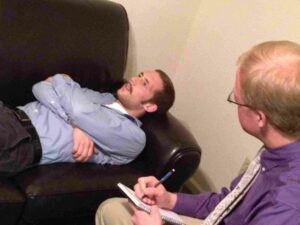Sleep is an essential part of our daily lives, yet many people struggle with sleep issues. Such problems can have a significant impact on their overall health and well-being. Hence, Sleep hypnotherapy is one of the effective approaches to resolve such issues. In this blog, we will explore the benefits of sleep hypnotherapy, how it is delivered, the techniques involved, and the science behind it. If you are struggling with sleep issues, read on to learn more about sleep hypnotherapy and whether it may be a helpful option for you.
Contents
What is Sleep Hypnotherapy?
 Sleep hypnotherapy is a form of hypnosis used to help people improve the quality of their sleep. During a session, a hypnotherapist will guide the client into a state of deep relaxation and suggest positive affirmations and imagery related to sleep. This can help reduce anxiety, quiet the mind, and promote a more restful night’s sleep. The goal is to train the mind and body to enter a state of relaxation and restfulness more easily, leading to improved overall sleep habits and better health.
Sleep hypnotherapy is a form of hypnosis used to help people improve the quality of their sleep. During a session, a hypnotherapist will guide the client into a state of deep relaxation and suggest positive affirmations and imagery related to sleep. This can help reduce anxiety, quiet the mind, and promote a more restful night’s sleep. The goal is to train the mind and body to enter a state of relaxation and restfulness more easily, leading to improved overall sleep habits and better health.
The Science Behind Sleep Hypnotherapy
The theory behind sleep hypnotherapy is that it works by helping the client to achieve a state of deep relaxation, which can reduce stress and anxiety, and promote restful sleep. When the mind and body are relaxed, it is easier for the client to fall asleep and stay asleep, leading to improved sleep quality.
One possible mechanism for the effectiveness of sleep hypnotherapy is that it can help to reduce arousal in the brain and promote the activity of the parasympathetic nervous system, which is responsible for promoting relaxation. Hypnosis has been shown to increase the activity of the parasympathetic nervous system, which can promote relaxation and reduce stress levels.
In addition, sleep hypnotherapy can help to address underlying psychological factors that may be contributing to sleep problems, such as anxiety or stress. By addressing these factors, sleep hypnotherapy can help clients to improve their overall sleep habits and promote better sleep quality.
Sleep Hypnotherapy Procedure
The procedure for sleep hypnotherapy may vary depending on the hypnotherapist and the specific needs of the client, but here is a general overview of what to expect:
Consultation
The consultation is an important part of the sleep hypnotherapy process, as it allows the hypnotherapist to gain a thorough understanding of the client’s sleep issues and goals. During the consultation, the hypnotherapist will typically ask the client about their sleep habits, including how long it takes them to fall asleep, how often they wake up during the night, and whether they feel rested in the morning. The hypnotherapist may also ask about any underlying medical or psychological conditions that could be contributing to sleep problems.
Preparation
Once the initial consultation is complete, the hypnotherapist will work with the client to create a comfortable and relaxing environment for the hypnosis session. This may involve dimming the lights, playing soothing music, and ensuring that the client is seated or lying down in a comfortable position. The hypnotherapist may also provide the client with guidance on how to prepare for the session, such as avoiding caffeine or other stimulants in the hours leading up to the session.
Induction and Suggestion
 The hypnotherapist will guide the client into a state of deep relaxation. Once the client is deeply relaxed, the hypnotherapist will make suggestions to the subconscious mind to promote relaxation and improve sleep quality. These may include instructions to imagine a peaceful sleep environment, to release physical tension, or to let go of racing thoughts. The hypnotherapist may also suggest that the client develop positive affirmations to use before bedtime, such as “I am calm and relaxed, and I sleep deeply and soundly.”
The hypnotherapist will guide the client into a state of deep relaxation. Once the client is deeply relaxed, the hypnotherapist will make suggestions to the subconscious mind to promote relaxation and improve sleep quality. These may include instructions to imagine a peaceful sleep environment, to release physical tension, or to let go of racing thoughts. The hypnotherapist may also suggest that the client develop positive affirmations to use before bedtime, such as “I am calm and relaxed, and I sleep deeply and soundly.”
Awakening
Once the suggestion phase is complete, the hypnotherapist will gradually bring the client out of the hypnotic state. This is typically done by counting backward from 10 or asking the client to take a deep breath. The client may feel relaxed and refreshed after the session and may notice improvements in their sleep quality over time.
Follow-up
Depending on the needs of the client, the hypnotherapist may schedule follow-up sessions to reinforce the suggestions and help the client to continue making positive changes to their sleep habits. The hypnotherapist may also provide the client with additional resources, such as recordings of relaxation exercises or tips for creating a sleep-friendly environment in their bedroom. The goal of follow-up sessions is to help the client to maintain the positive changes they have made and to develop long-term habits that promote healthy sleep.
Techniques Used In Sleep Hypnotherapy
There are several techniques in sleep hypnotherapy to help clients achieve a state of deep relaxation and improve their sleep quality. Some of these techniques include:
Visualization
In this technique, the hypnotherapist guides the client to imagine a peaceful sleep environment, such as a beach or a forest. The client is encouraged to use all their senses to create a vivid mental picture of their surroundings, including the sights, sounds, smells, and tactile sensations. This technique helps the client to relax and focus on positive thoughts and emotions associated with sleep, which can reduce anxiety and promote restful sleep.
Progressive muscle relaxation
 This technique involves tensing and then relaxing specific muscle groups in the body, starting from the toes and moving upward to the face and head. The hypnotherapist guides the client to tense each muscle group for a few seconds and then release the tension, allowing the muscle to relax completely. This technique helps to release physical tension and reduce stress in the body, leading to deeper relaxation.
This technique involves tensing and then relaxing specific muscle groups in the body, starting from the toes and moving upward to the face and head. The hypnotherapist guides the client to tense each muscle group for a few seconds and then release the tension, allowing the muscle to relax completely. This technique helps to release physical tension and reduce stress in the body, leading to deeper relaxation.
Breathing exercises
Breathing exercises in sleep hypnotherapy involve guiding the client to take slow and deep breaths. It involves focusing on the sensation of the breath as it enters and leaves the body. This technique helps to slow down the heart rate, lower blood pressure, and calm the mind, leading to a state of relaxation.
Positive affirmations
Positive affirmations in sleep hypnotherapy are short and positive statements. The therapist repeats these affirmations to the client during the hypnosis session. These statements promote positive thinking and help the client to visualize positive sleep outcomes. Examples of positive affirmations might include “I am calm and relaxed,” “I am free from worry,” or “I sleep soundly and deeply.”
Hypnotic suggestions
Hypnotic suggestions in sleep hypnotherapy help the client to make positive changes in their sleep habits. For example, the hypnotherapist may suggest that the client sets a regular sleep schedule or avoids using electronic devices before bedtime. The therapist gives these suggestions to the client while he is in a state of deep relaxation. This makes them more receptive to change.
Benefits Of Sleep Hypnotherapy
 Sleep hypnotherapy can offer several benefits for individuals struggling with sleep issues. Here are some potential benefits:
Sleep hypnotherapy can offer several benefits for individuals struggling with sleep issues. Here are some potential benefits:
- Improved sleep quality: Sleep hypnotherapy can help individuals to achieve deeper, more restful sleep. By promoting relaxation and reducing stress, sleep hypnotherapy can help individuals to fall asleep more quickly, stay asleep longer, and wake up feeling more refreshed.
- Reduced anxiety and stress: Stress and anxiety are common causes of sleep problems, and sleep hypnotherapy can help to reduce these symptoms. By promoting relaxation and providing coping strategies for stress, sleep hypnotherapy can help individuals to feel calmer and more centered.
- Improved mood: Getting a good night’s sleep can have a positive impact on mood, and sleep hypnotherapy may help individuals to feel more optimistic. By reducing stress and anxiety, sleep hypnotherapy may also help individuals to manage symptoms of depression and other mood disorders.
- Better physical health: Chronic sleep deprivation can contribute to a range of physical health problems, including obesity, diabetes, and heart disease. By promoting better sleep, sleep hypnotherapy may help individuals to reduce their risk of these and other health conditions.
- Non-invasive: Sleep hypnotherapy is a non-invasive, drug-free approach to treating sleep problems. Unlike sleep medications, which can have side effects and risks of dependency, sleep hypnotherapy is generally safe and well-tolerated.
Conclusion
In conclusion, sleep hypnotherapy can be a helpful and effective approach for individuals struggling with sleep issues. By promoting relaxation, reducing stress and anxiety, and improving sleep quality, sleep hypnotherapy may offer several potential benefits for both physical and mental health. However, it is important to seek help from a qualified hypnotherapist or healthcare professional before starting any new treatment approach to ensure safety and effectiveness. Don’t hesitate to seek help if you are struggling with sleep issues, as there are many treatment options available.
For more information, please contact MantraCare. Sleep is an essential part of our daily routine and it plays a significant role in maintaining a healthy body and mind. If you have any queries regarding Online Insomnia Counseling experienced therapists at MantraCare can help: Book a trial therapy session.


